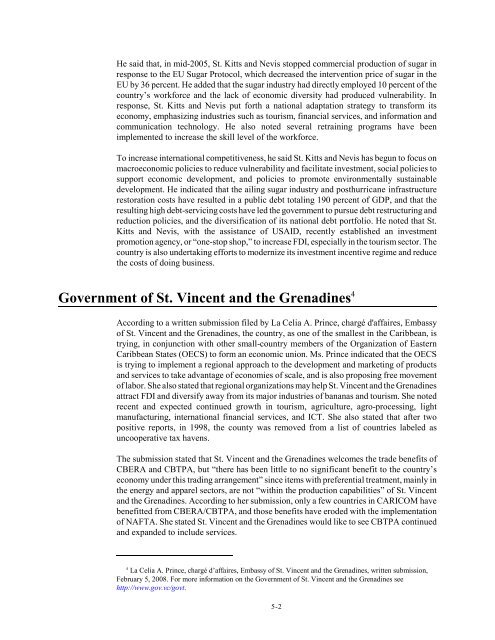Caribbean Region: Review of Economic Growth and ... - USITC
Caribbean Region: Review of Economic Growth and ... - USITC
Caribbean Region: Review of Economic Growth and ... - USITC
Create successful ePaper yourself
Turn your PDF publications into a flip-book with our unique Google optimized e-Paper software.
He said that, in mid-2005, St. Kitts <strong>and</strong> Nevis stopped commercial production <strong>of</strong> sugar inresponse to the EU Sugar Protocol, which decreased the intervention price <strong>of</strong> sugar in theEU by 36 percent. He added that the sugar industry had directly employed 10 percent <strong>of</strong> thecountry’s workforce <strong>and</strong> the lack <strong>of</strong> economic diversity had produced vulnerability. Inresponse, St. Kitts <strong>and</strong> Nevis put forth a national adaptation strategy to transform itseconomy, emphasizing industries such as tourism, financial services, <strong>and</strong> information <strong>and</strong>communication technology. He also noted several retraining programs have beenimplemented to increase the skill level <strong>of</strong> the workforce.To increase international competitiveness, he said St. Kitts <strong>and</strong> Nevis has begun to focus onmacroeconomic policies to reduce vulnerability <strong>and</strong> facilitate investment, social policies tosupport economic development, <strong>and</strong> policies to promote environmentally sustainabledevelopment. He indicated that the ailing sugar industry <strong>and</strong> posthurricane infrastructurerestoration costs have resulted in a public debt totaling 190 percent <strong>of</strong> GDP, <strong>and</strong> that theresulting high debt-servicing costs have led the government to pursue debt restructuring <strong>and</strong>reduction policies, <strong>and</strong> the diversification <strong>of</strong> its national debt portfolio. He noted that St.Kitts <strong>and</strong> Nevis, with the assistance <strong>of</strong> USAID, recently established an investmentpromotion agency, or “one-stop shop,” to increase FDI, especially in the tourism sector. Thecountry is also undertaking efforts to modernize its investment incentive regime <strong>and</strong> reducethe costs <strong>of</strong> doing business.Government <strong>of</strong> St. Vincent <strong>and</strong> the Grenadines 4According to a written submission filed by La Celia A. Prince, chargé d'affaires, Embassy<strong>of</strong> St. Vincent <strong>and</strong> the Grenadines, the country, as one <strong>of</strong> the smallest in the <strong>Caribbean</strong>, istrying, in conjunction with other small-country members <strong>of</strong> the Organization <strong>of</strong> Eastern<strong>Caribbean</strong> States (OECS) to form an economic union. Ms. Prince indicated that the OECSis trying to implement a regional approach to the development <strong>and</strong> marketing <strong>of</strong> products<strong>and</strong> services to take advantage <strong>of</strong> economies <strong>of</strong> scale, <strong>and</strong> is also proposing free movement<strong>of</strong> labor. She also stated that regional organizations may help St. Vincent <strong>and</strong> the Grenadinesattract FDI <strong>and</strong> diversify away from its major industries <strong>of</strong> bananas <strong>and</strong> tourism. She notedrecent <strong>and</strong> expected continued growth in tourism, agriculture, agro-processing, lightmanufacturing, international financial services, <strong>and</strong> ICT. She also stated that after twopositive reports, in 1998, the county was removed from a list <strong>of</strong> countries labeled asuncooperative tax havens.The submission stated that St. Vincent <strong>and</strong> the Grenadines welcomes the trade benefits <strong>of</strong>CBERA <strong>and</strong> CBTPA, but “there has been little to no significant benefit to the country’seconomy under this trading arrangement” since items with preferential treatment, mainly inthe energy <strong>and</strong> apparel sectors, are not “within the production capabilities” <strong>of</strong> St. Vincent<strong>and</strong> the Grenadines. According to her submission, only a few countries in CARICOM havebenefitted from CBERA/CBTPA, <strong>and</strong> those benefits have eroded with the implementation<strong>of</strong> NAFTA. She stated St. Vincent <strong>and</strong> the Grenadines would like to see CBTPA continued<strong>and</strong> exp<strong>and</strong>ed to include services.4La Celia A. Prince, chargé d’affaires, Embassy <strong>of</strong> St. Vincent <strong>and</strong> the Grenadines, written submission,February 5, 2008. For more information on the Government <strong>of</strong> St. Vincent <strong>and</strong> the Grenadines seehttp://www.gov.vc/govt.5-2
















